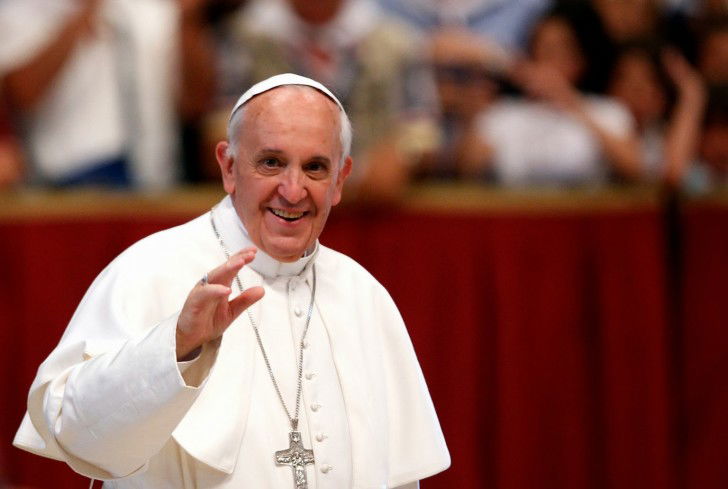Headlines
Pope avoids reference to Rohingya in Myanmar speech

Yangon, Nov 28
Pope Francis on Tuesday delivered a keynote speech in Myanmar after meeting the country's de facto leader Aung San Suu Kyi, demanding "respect for each ethnic group" but without referring to the persecuted Rohingya Muslim minority by name.
Standing alongside Suu Kyi, the Pope spoke mostly in general terms. His highly-anticipated remarks may draw condemnation from human rights activists who blame the Myanmar Army for driving out hundreds of thousands of Rohingyas from the country.
Although the Pope made no direct reference to Rohingyas, his speech was a strong defence of ethnic rights, the BBC reported.
He said: "The future of Myanmar must be peace, a peace based on respect for the dignity and rights of each member of society, respect for each ethnic group and its identity, respect for the rule of law and respect for a democratic order that enables each individual and every group to offer its legitimate contribution to the common good."
The Pope said Myanmar's greatest treasure was its people and that they had "suffered greatly and continue to suffer, from civil conflict and hostilities that have lasted all too long and created deep divisions.
"As the nation now works to restore peace, the healing of those wounds must be a paramount political and spiritual priority."
He added: "Religious differences need not be a source of division and distrust, but rather a force for unity, forgiveness, tolerance and wise nation-building."
In her speech, Suu Kyi also made no direct reference to the Rohingya Muslims. However, she accepted the situation in Rakhine state had "most strongly captured the attention of the world".
She said that "social, economic and political" issues had "eroded trust and understanding, harmony and co-operation between different communities in Rakhine".
Suu Kyi has been criticized for her lack of action over the issue. She was stripped of the Freedom of the City of Oxford on Monday, with British councillors saying they no longer wished to honour those who turned a "blind eye to violence".
Myanmar denied UN accusations that the treatment of the Muslim community amounted to "ethnic cleansing". It said the crackdown in Rakhine state, which began in late August, was to root out violent insurgents.
The Pope is on the second day of a four-day visit to the country. In an earlier 40-minute meeting in Yangon with leaders of the Buddhist, Islamic, Hindu, Jewish and Christian faiths, he also made no direct reference to the Rohingyas, according to Vatican officials.
He also met Buddhist leader Sitagu Sayadaw separately to discuss peaceful coexistence among communities in the country. On Wednesday, the Pope will celebrate a huge Mass in Yangon, Efe news reported.
After Myanmar, he will move on to Bangladesh to meet a small group of Rohingya refugees in a symbolic gesture.
The pontiff will become the first Catholic leader to visit Dhaka since 1986.
The Pope spoke in Spanish during the 40-minute meeting and drew a difference between unity and uniformity, warning that while unity was beautiful, an insistence on uniformity could lead to cultural colonialism, reports Efe news.
"Everyone has their values, their wealth and their shortcomings. Each faith has their traditions, their wealth to give, and this can only happen if we live in peace," he said.
The meeting was held at the archdiocesan headquarters, where the Pope is staying after he arrived here on Monday.
The Bishop of the Pathein Diocese in Myanmar John Hsane Hgyi had opened the meeting, followed by leaders from Buddhist, Muslim, Hindu, Jewish, Anglican and Roman Catholic faiths, according to Vatican spokesperson Greg Burke.
During the meeting, the pontiff urged Myanmar's religious leaders to understand the value of ethnic and religious differences they represented, rather than be daunted by them.
He also met Buddhist leader Sitagu Sayadaw separately to discuss peaceful coexistence among communities in the country that has been in the spotlight for months over continuing atrocities against the Rohingya Muslim minority.
The Pope will travel to capital Nay Pyi Taw later on Tuesday to meet President Htin Kyaw and Nobel Peace Laureate and the de-facto leader Aung San Suu Kyi. The humanitarian crisis of the Rohingya plays a crucial role in Pope Francis' visit to Myanmar.
On Thursday he will head to neighbouring Bangladesh in an attempt to mediate the crisis, which the UN has dubbed a "textbook example of ethnic cleansing".
The pontiff will become the first Catholic leader to visit Dhaka since 1986.
In Bangladesh, Francis is scheduled to meet a small group of Rohingya refugees in a symbolic gesture.



































